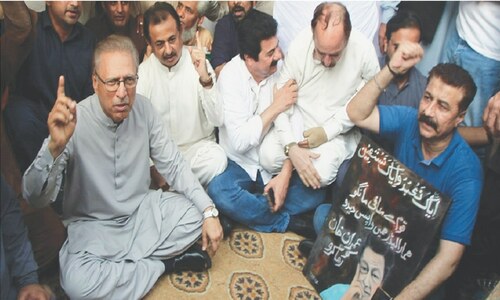IT had all the potential of a public relations coup. A day after army chief Gen Raheel Sharif waded into the anti-corruption debate by calling for across-the-board accountability, he provided a compelling example of his commitment to the cause when it emerged that he had unprecedentedly dismissed from military service a three-star and a two-star general, three brigadiers and a colonel.
News of the dismissals was sure to dominate the political discourse — and it did. But there appeared to be a breakdown, perhaps deliberately so, when it came to the communications of the otherwise superbly well-oiled ISPR machine.
Rather than official comment, the media was given inaccurate early information by a clutch of unnamed military officials.
Even after clarification was offered about the number of officers acted against — earlier reports had suggested a larger number of officers had been found guilty of corruption — there were no details shared regarding the charges that the officers faced or the findings of the court.
Nevertheless, it is a beginning — the guilty being found guilty by their own institution suggests a new willingness to focus on professionalism and probity.
Consider that the officers involved were serving in a province where the military has insisted that a range of unprecedented threats — state and non-state, internal and external — are undermining the security and stability of the country itself.
With the vast security responsibilities that the military has arrogated to itself in Balochistan and the life-and-death policy and operational decisions that senior officers routinely make, the quality of officers serving in the province ought to be second to none and their reputations impeccable.
Perhaps GHQ ought to conduct a more wide-ranging probe about the various streams of corruption, both along the border and when dealing with local populations, that are widely rumoured in the province.
To fight external enemies and win over disaffected local populations, surely the military’s reputation must be above reproach in every respect.
Inevitably, however, there are lessons here for the political leadership of the country. The military dominates the civil-military relationship for many reasons, historical and institutional.
But perhaps one of the greatest assets of the military is its understanding of the public mood — and willingness to align with it and exploit it. For weeks now, the fallout of the Panama Papers has dominated the political discourse in the country — and yet absolutely nothing whatsoever has been done to prove that the civilians are serious about combating corruption.
Meanwhile, an internal military investigation that appears to stretch back at least a year has suddenly been unveiled and offered as the centrepiece of the military’s own efforts to cleanse itself.
The political class needs to understand that legitimacy does not just flow from elections — it also flows from the quality of democracy and governance that the politicians deliver.
Sadly, it is the military that time and again has demonstrated a more sophisticated understanding of politics than the politicians themselves.
Published in Dawn, April 23rd, 2016










































